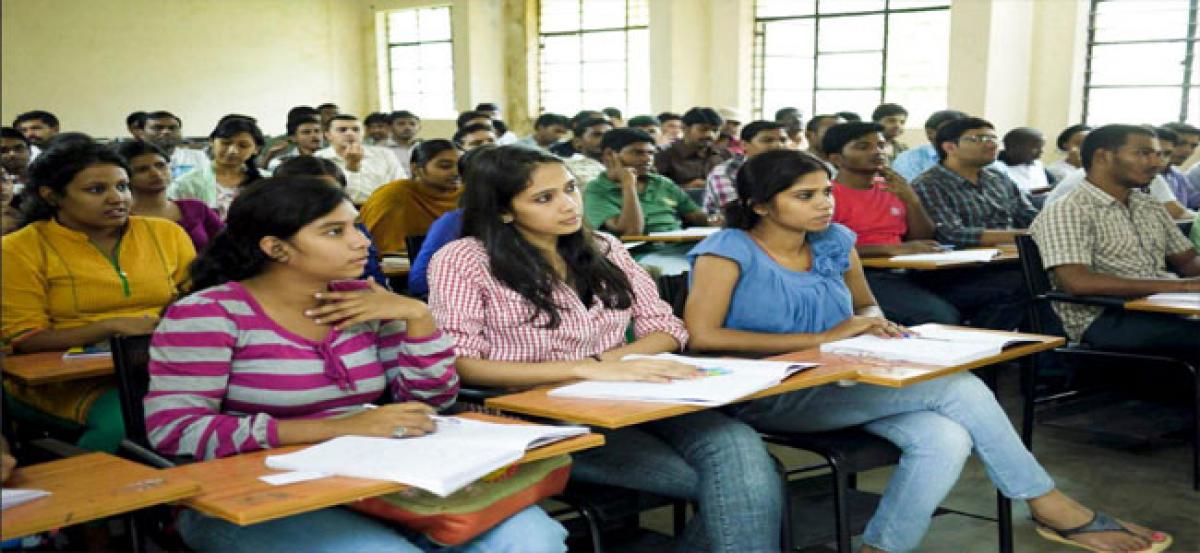Live
- Heart muscle can regenerate after failure in some people with artificial hearts: Study
- If Kohli can be picked up, why not Ashwin?
- Governor Jishnu Dev Attends 'World Meditation Day' Celebration at Gachibowli Stadium
- CM Revanth Reddy Pays Tribute to Freedom Fighter Gaddam Venkataswamy
- Market Outlook: US bond yields, dollar index, FII data key triggers for next week
- Remembering maths genius Ramanujan
- The Third Eye: Ensuring an efficient governance
- Service activities of Ambica Sishu Kendra hailed
- Help in comprehensive development of Nellore dist
- Death toll in Punjab building collapse rises to two
Just In

There is a yawning gap between what Indian higher education (HE) students are taught and ground realities and one way of addressing this is to improve the relevance of the curriculum and pedagogy to fit the world of work and international developments, says a survey conducted by Indian stakeholders and experts at Bournemouth University, whose Pro-Vice Chancellor Sonal Minocha .
New Delhi: There is a yawning gap between what Indian higher education (HE) students are taught and ground realities and one way of addressing this is to improve the relevance of the curriculum and pedagogy to fit the world of work and international developments, says a survey conducted by Indian stakeholders and experts at Bournemouth University, whose Pro-Vice Chancellor Sonal Minocha is the first woman of Asian origin to occupy the position at any British university.
"There is a gap between what is taught at university and real-life developments in the world of work -- 65 per cent of academics stated that students in Indian HE are unable to demonstrate that they have had the opportunity to apply graduate-level skills and gain industry exposure," Minocha, a commerce graduate from Delhi's Jesus and Mary College and who holds business degrees from Northumbria University, told IANS in an e-mail interview.
That finding was reinforced by students, with only 37 per cent of them agreeing that Indian universities offer relevant and current training development opportunities; as well as by employers and industry representatives -- only 33 per cent of them believed that students and graduates are able to demonstrate the necessary higher-level skills and knowledge that they are looking for in their industry, she said.
This finding was also reinforced by NGOs -- 45 per cent of whom stated that HE fails to prepare students for the global workplace in understanding international standards. Thus, policymakers argued for universities to do more in the areas of entrepreneurship and innovation -- critical in supporting the government's efforts in skilling India. Nevertheless, only 30 per cent of policymakers said that universities have the necessary academic and professional staff to provide students with industry-relevant knowledge and skills.
Preliminary insights for policy and practice include:
1. Improving the relevance of Indian HE curriculum and pedagogy to fit the world of work and international developments -- through the introduction of international standards in Indian HE and development of practice-based HE curriculum and pedagogies.
2. Embedding entrepreneurship, innovation and world-leading research culture to improve the Indian HE system -- through channelling resources for research and innovation, the introduction of entrepreneurship modules, and focus on providing solutions to India's "grand challenges".
3. Positioning internationalisation at the core of Indian HE -- through targeted global engagement initiatives at course, institutional and sectoral level, including internationalisation of the curriculum and the introduction of outward mobility opportunities for students and faculty.
4. Providing opportunities for employers to actively participate in the design, development and delivery of education and employability-driven initiatives -- through the development of an employer engagement framework for collaboration and input into the design, development and delivery of Indian HE.
5. Enabling widening participation and equality to educate and skill India's youth talent -- through providing access to HE and higher-level skills development opportunities for students from different socio-economic backgrounds and enabling a level playing field for students who come from rural areas and those from cities.
How did the "Global Talent in India: Challenges and Opportunities for Skills Development in Higher Education" report come about?
"Over the last three years, we have been working with a range of stakeholders from industry, academia and government to develop insight and understanding of the challenges faced in developing future-ready talent that is needed for an increasingly global world of work," Minocha explained.
Rapidly growing economies with a large youth population such as India face a set of unique challenges in attaining their potential. Equally, they also have a great opportunity to embrace innovation and creative approaches that will aid their growth and the development of the talent pipeline in the process, she added.
"There is a very clear higher-level skills gap in India, which is estimated to cost the Indian economy as much as $8.61 billion in lost productivity (PwC, 2014). Our report offers preliminary findings for consideration by educators, employers and policymakers in tackling India's graduate-level skills development challenge. Findings from our report sought to improve our understanding of the role of Indian HE in narrowing this gap and provide some ideas for improving the productivity of its workforce through HE," Minocha explained.
The research was undertaken in Delhi, Pune and Chennai and, through detailed interviews and surveys, the views of 270 HE leaders, educators, students, employers, policymakers and NGOs were gathered. A total of 35 people were interviewed and a further 235 people completed a survey. Organisations participating in this study included representatives from high-profile HE institutions, including IITs, IIMs, the University of Madras and Delhi University.
Employers included Alibaba India, CNN India, Google, Accor and a range of entrepreneurs. A range of influential policymakers including the Ministry of Skill Development and Entrepreneurship, National Skill Development Corporation, Sector Skills Councils and the Department for Education in Delhi and Chennai also took part in the study.

© 2024 Hyderabad Media House Limited/The Hans India. All rights reserved. Powered by hocalwire.com







